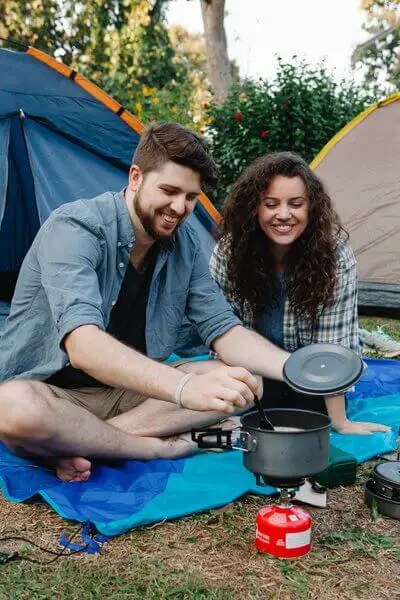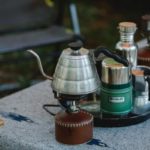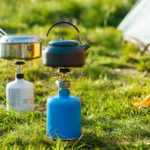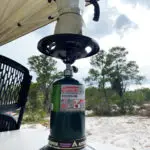Most campers have started relying on propane tanks for heating and cooking on camping trips. This is a safe alternative because you can take propane canisters wherever you go. That means you are responsible for the amount of propane you take on a trip. At the same time, you are responsible for making it last the entire trip.
Guessing how long the propane tank will last is not a good idea. A better idea is to calculate the approximate amount of propane you will need for your trip, depending on your needs. That will help you determine how much propane you should take on the trip without running out of it or having too much leftover propane at the end.
To learn how long a propane tank will last and how to calculate the amount you need, stick around for this guide. I will tell you all you need to know about small and large propane canisters, so stay tuned for that!
More...

Table of Contents
How Long Does 16 Oz Propane Really Last?
A 16.4 oz propane tank is the same as a 1lb propane tank. So, do not let this confuse you – it is the same amount of propane presented with a different measurement unit.
These small propane cylinders are the best for camping trips because of their convenient size. The tanks are quite lightweight but are also very easy to use. You can use them with various camping devices, including grills, heaters, camping stoves, etc.
One could say that a 16 oz propane tank will last about an hour on a device that demands more propane to run, whereas a more specific device will take at least 4 or 5 hours to empty the same tank. So, how long your tank lasts will depend on how and where you use it.
Before a camping trip, it is a good idea to calculate the amount of propane you need. Try adding the tank to your device and using the device as you would on that trip. Check to see how long it takes for the tank to run out. If you see that the tank lasts longer than expected, try to measure how much of it is left in the end.
A simple method to check how full or empty the tank is is to pour some hot water on it. You can boil or use the water straight from the water heater, but ensure it is hot and not lukewarm. Then, pour it over the tank and see where a cold spot appears. Wherever the spot is, that is where the propane is.
These are all helpful tips you can use when preparing for your camping trip. But before you set off on your trip, I want to tell you about a few devices and their propane consumption. Let’s look into them and see what you need to keep in mind:
How Long Does a 16 Oz Propane Tank Last on a Grill?
Since the 16.4 oz tank is one of the smallest propane tanks you can find, you cannot expect it to last a very long time. This type of tank will last only an hour or two on a regular grill. That should be enough for you to cook one meal, but that is enough only if you are taking a one-day trip. For longer trips, you will need more tanks and propane.
It is a good idea to consider the amount of food you need to prepare with the grill. Then, check the grill’s BTU rating. That will tell you how much propane the grill needs to run, so you can use that information to calculate the amount of propane you should take.
If you have yet to buy a camping grill or stove, I recommend looking into the grills with a low BTU consumption rate. That will help you save on propane, but even more important is that you will not carry much weight on your trip.
Taking the propane tanks on a trip will not be a problem if you are car camping. But if you are backpacking, you will have limited space for the tanks, and you will not be able to carry too many because they will weigh you down. This is why you must be very smart about weight distribution and packing.
You might want to consider packing for the trip early and seeing if you can carry all the propane tanks you plan to take. If your backpack turns out to be too heavy, you must go with plan B. That would be finding an alternative way to cook. It is either that or changing the meals.
I recommend going with pre-made or ready-made meals. That way, even if you run out of propane or cannot carry a lot of it, you will still have a good meal to keep you going.
How Long Does a 16 Oz Propane Tank Last on a Heater?
The propane stove or grill is not the only device that runs on propane. You can also use a camping heater for your winter camping trips. These heaters also run on propane tanks, so you will have to take a few propane tanks to be able to run the heaters during the trip.
Most campers use the Coleman propane tank to run their heater. A 16.4 oz tank from this company will last about two hours when used with a camping heater. You can extend that time if you set the heater on low heat, while you can reduce it by setting it on high heat.
One of the things I want to recommend is running the heater in your tent only when you are in it. Never leave it unattended as it can cause certain issues.
When you first turn the heater on, leave it on high heat. It should take 20 minutes for your tent to feel warm. When the temperature inside the tent becomes comfortable for you, switch the heater to low heat. That will help you save propane and keep your tent as warm as needed.
Of course, this goes only for winter trips. During the summer, you do not need to take any propane for heating. That will lower the weight you carry and free up some space, allowing you to take some other things you need.
Wrap-Up
Thank you for sticking with me through this guide. I hope you learned a lot about the 16 oz propane tank, how to use it, how long it will last, and how to check its contents at any given time. Since propane is something you should not be playing with, please remember all the tips provided throughout this guide, as they are crucial to your safety.
Have you ever used a 16 oz tank or any other kind of propane tank? Do you fancy using them on backpacking trips or even in your home? Let me know your thoughts on this topic – I cannot wait to read all the comments you share with me!
- Are Merrell Shoes Good? – An Unbiased Review of Merrell Footwear - December 9, 2023
- Where Are Merrell Shoes Made? - December 9, 2023
- Camping in 40-degree Weather: Tips and Tricks - September 25, 2023


![How Long Does Butane Canister Last? [Detailed Answer] How Long Does Butane Canister Last? [Detailed Answer]](https://grandcircletrails.com/wp-content/uploads/2022/04/How-Long-Does-Butane-Canister-Last-1-150x150.jpg)

![How Long Will Ice Last in a Yeti Cooler? [Read Here] How Long Will Ice Last in a Yeti Cooler? [Read Here]](https://grandcircletrails.com/wp-content/uploads/2022/02/How-Long-Will-Ice-Last-in-a-Yeti-Cooler-1-150x150.jpg)

